Roles and Responsibilities of Property Developers
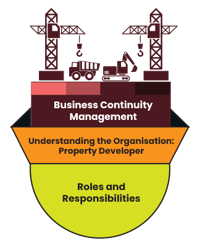 What is a Property Developer?
What is a Property Developer?
A property developer is a professional or a company that oversees and coordinates the real estate development process, from the initial concept and site selection to the construction and completion of residential, commercial, or industrial properties.
.png?width=347&height=347&name=Focusing%20on%20the%20a%20typical%20property%20developer%20testing%20and%20exercising%20their%20business%20continuity%20plan%20(1).png) A property developer is an individual or company responsible for planning, financing, constructing, and marketing real estate projects, transforming raw land or dilapidated buildings into valuable and functional properties.
A property developer is an individual or company responsible for planning, financing, constructing, and marketing real estate projects, transforming raw land or dilapidated buildings into valuable and functional properties.
Property developers play a critical role in creating new buildings and infrastructure, adding value to land, and transforming spaces to meet the demands of markets and communities.
Property developers engage in various activities, including acquiring land, securing necessary permits, hiring architects and construction firms, and arranging financing to bring a project to fruition.
Depending on their expertise and market demand, they often work on residential, commercial, industrial, or mixed-use developments. Unlike traditional builders, who may focus solely on construction, property developers take a broader, more strategic role in overseeing the entire lifecycle of a real estate project, from conceptualisation to final sale or lease.
Understanding the roles and responsibilities of property developers before implementing the BCM project is important. Each industry will require different treatment when implementing its business continuity initiatives.
What are the Commercial Roles and Responsibilities of a Property Developer?
Property development is highly dynamic and complex, requiring a deep understanding of market trends, zoning laws, regulatory requirements, and financial risk management. Developers constantly balance various risks, such as fluctuating property values, supply chain dependencies, environmental impact regulations, and community engagement.
Property development is also capital-intensive and involves long timelines, meaning developers must navigate economic shifts and anticipate market demands far into the future. Given this complexity, property development is as much a strategic business endeavour as a technical construction project, requiring developers to make informed decisions that maximise profitability and societal impact.
The responsibilities of a property developer extend beyond mere project completion; they include ensuring the quality, sustainability, and compliance of each development. Developers coordinate with stakeholders such as investors, government agencies, contractors, and potential buyers or tenants to ensure each project aligns with zoning laws, building codes, environmental standards, and community needs.
Additionally, developers are responsible for managing financial risks and securing investments to fund the project. They also oversee project timelines and budget constraints, working closely with project managers to prevent delays and cost overruns. Ultimately, a property developer's role is multi-faceted, balancing vision, execution, and compliance to bring meaningful and functional spaces to life in alignment with market needs.
The commercial roles and responsibilities of a property developer typically include:
1. Land Acquisition
- Developers acquire land or property that has the potential for development or redevelopment.
- They typically purchase vacant land, underutilised property, or buildings that need renovation.
2. Planning and Design
- Property developers design projects with architects, engineers, and urban planners.
- They create blueprints for land or building development and navigate local zoning laws and regulations to ensure compliance.
3. Financing
- Developers often secure financing through personal funds, bank loans, or investors.
- Real estate development projects are capital-intensive, so a significant part of the developer's role is managing funding and cash flow for the project.
4. Construction Management
- Developers oversee the construction process, hiring contractors and subcontractors to execute the building phase.
- This includes managing timelines, materials, and labour to complete the project.
5. Marketing and Sales
- After the project is built or renovated, the developer markets the property to potential buyers or tenants.
- This may involve selling individual units for residential properties, while for commercial properties, it often involves leasing to businesses.
6. Legal and Regulatory Compliance
- Property developers ensure that all local, state, and federal regulations are followed, including land use, environmental laws, and building codes.
7. Risk Management
- Development projects are inherently risky, involving market demand, construction delays, and financial uncertainty.
- A developer must assess and manage these risks throughout the project's lifecycle.
Summing Up ...
A property developer is an individual or entity responsible for transforming land or existing structures into usable, marketable real estate properties. Unlike builders who focus primarily on construction, property developers oversee the entire development lifecycle—from acquiring land and securing financing to managing construction and marketing the final property.
This role requires a comprehensive approach to project management and a strategic vision for aligning each development with market trends and community needs. Depending on their expertise, property developers often work on residential, commercial, or industrial projects and play a vital role in shaping urban and suburban landscapes.
Property development involves careful risk management and adherence to various regulations and codes. Developers must consider market fluctuations, environmental regulations, and extended project timelines, which can impact profitability.
Their responsibilities include coordinating with stakeholders, securing investment, adhering to zoning laws, and ensuring quality construction within budget and timelines. Ultimately, property developers balance a mix of strategic planning, financial acumen, and operational oversight to create valuable, functional properties that meet market demand while adhering to safety and environmental standards.
Knowing the specific roles and responsibilities will help set up the appointed members of the BCM team, even though they are part-time. This understanding will also assist in selecting the right roles to provide the critical business functions of a specific property developer. A well-defined organisational structure will ensure clear lines of authority and responsibility.
Understanding Business Continuity Management for Property Developers |
|||
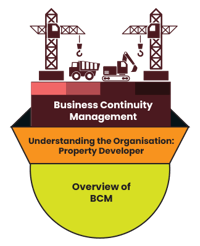 |
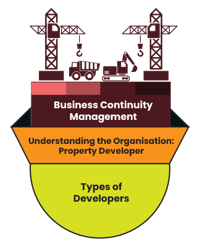 |
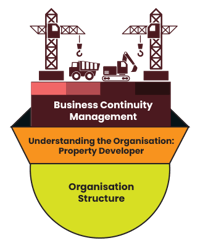 |
 |
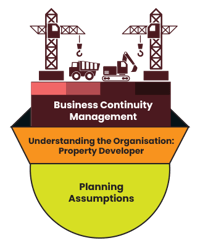 |
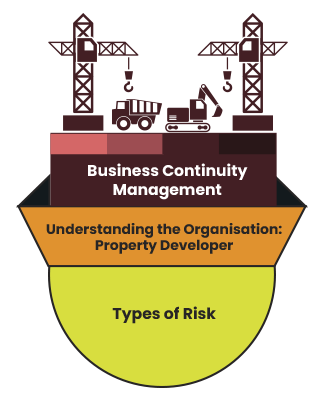 |
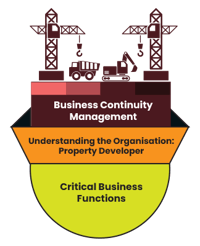 |
|
More Information About Business Continuity Management Courses

 To learn more about the course and schedule, click the buttons below for the BCM-300 Business Continuity Management Implementer [B-3] course and the BCM-5000 Business Continuity Management Expert Implementer [B-5].
To learn more about the course and schedule, click the buttons below for the BCM-300 Business Continuity Management Implementer [B-3] course and the BCM-5000 Business Continuity Management Expert Implementer [B-5].
![Register [BL-B-3]*](https://no-cache.hubspot.com/cta/default/3893111/ac6cf073-4cdd-4541-91ed-889f731d5076.png) |
 |
 |
 |
 |
 |
![FAQ [BL-B-3]](https://no-cache.hubspot.com/cta/default/3893111/b3824ba1-7aa1-4eb6-bef8-94f57121c5ae.png) |
If you have any questions, click to contact us.
|
 |
 |
 |
 |


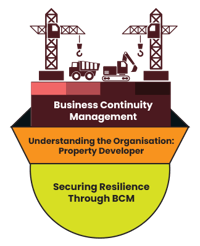
![Email to Sales Team [BCM Institute]](https://no-cache.hubspot.com/cta/default/3893111/3c53daeb-2836-4843-b0e0-645baee2ab9e.png)

